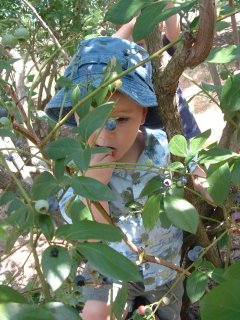From the age of five, I lived in a house with no television. Technically there was a broken television in the basement that we'd bring up for presidential elections, wrap with coathangers, and squint at. But even in the seventies, that didn't really count.
This does not mean I have never seen an episode of Gilligan's Island or Bugs Bunny. What this meant for my elementary school years is that I would wake up painfully early on Saturdays and begin scouring the neighborhood looking for a child who was awake so I could watch cartoons with them. I'd stand below their window calling their name until either they woke up, or their mother stuck a head out and explained that they had been sent to Australia.
Much like living in a house without running water, after a while, I developed a perverse pride in the adversities of childhood. I read everything available, whether I understood it or not, dictionaries be damned. (It took me years to comprehend concepts introduced in
The Long Secret by Louise Fitzhugh. I've finally comprehended the menstrual cycle, but I'm still fuzzy on how all these families spent their summers in cabins without their fathers.) I learned to rollerskate and read at the same time, in circles, in the basement. This is particularly exciting in retrospect since my mother also witnessed me walk into a mailbox while reading during that stage. Books were friends who never mocked ugly clothes, or cared that you were socially inept.
The affair all started so innocently. A television with a VCR, my boyfriend promised, would mean we'd spend less on entertainment. Since we couldn't get any stations without cable, it's not like we'd actually watch programs, just movies. Then my now husband laid the groundwork for undermining my perversity. He explained how frustrating it was to watch sports when you can't differentiate between the team colors. (He did not explain the solution when you can't remember which team is which color or which one I was supposed to root for.) Then, when I was pregnant, we visited with his mother, and he got me hooked on all the baby programs:
A Baby Story, An Adoption Story, Special Delivery. The kid was the final blow. Books were too hard. I didn't have the ability to read a sentence and comprehend it on the first try. Or the second. Holding a book and nursing at the same time was really hard. Not that I tried more than once. Most painful, I had to be awake in the most horrible early morning hours, and books simply put me right back to sleep.
That's when my husband ordered, not just cable, but cable with dvr, the ability to see shows long after they've aired. (Cue the ominous music.) I made a new best friend.
My new best friend is awake any time I want company- even better than my friend in Germany, whose time difference should have allowed for good companionship. But to hold a conversation with her, I would have had to think, and thinking is really not something I'm capable of when I haven't had 5 consecutive hours of sleep in weeks.
My new best friend repeats without complaining. The home shows (or home porn, as I've heard them called) are really good at this. They cut away to a commercial, and when they come back, they summarize everything that happened before the break. Perfect for anyone with short term memory loss, and anyone whose left ear was screamed into the first half of the show.
My new best friend was perfect in every way I could want, except it didn't cook meals or clean diapers. But we overlook these flaws in our friends.
Like any slightly inappropriate roommate, now I have to determine what relationship the toddler is allowed to have with the television. Already one of his most beloved friends is
Maisy. Maisy is a lovely friend, and was an excellent babysitter when my husband helped unload 20 new windows from a delivery truck that came with insufficient muscle. Maisy comes in short segments so you can interrupt viewing after an appropriately short time frame to go exciting places like the bank and the hardware store. Maisy even has an amusing friend Charlie who appears to be high on marijuana at all times. Exposure to Charlie might be good for broadening the toddler's mind, much like travel in Europe.
But I have a secret weapon to battle his burgeoning addiction. His Granmary just got him a new book, "Things An Go," and it looks like true love.
Official Title: Cars and Trucks and Things That Go, by Richard Scarry
